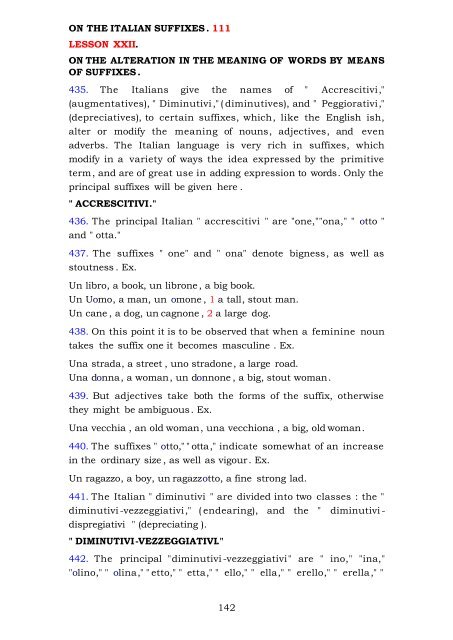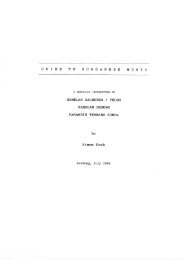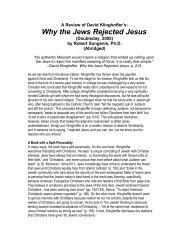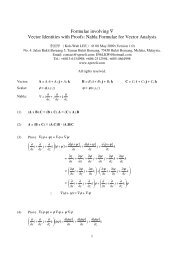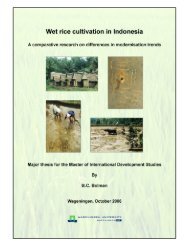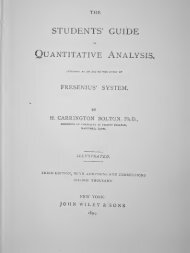- Page 1 and 2:
[The text had dots under many "e, o
- Page 3 and 4:
The Written Accent . The Apostrophe
- Page 5 and 6:
THE ALPHABET 1. The Italian Alphabe
- Page 7 and 8:
PRONUNCIATION OF GLI. 32. GLI is pr
- Page 9 and 10:
RULES FOR DIVIDING WORDS INTO SYLLA
- Page 11 and 12:
THE WRITTEN ACCENT. 65. There is on
- Page 13 and 14:
ON READING AND SPEAKING ITALIAN. 76
- Page 15 and 16:
è un uomo 2 di buona natura . Hann
- Page 17 and 18:
It is not proper to whisper in comp
- Page 19 and 20:
82. The is translated by " lo " in
- Page 21 and 22:
Egli è stimato da tutti. He is est
- Page 23 and 24:
Elleno, or esse, | 105 1 The Gerund
- Page 25 and 26:
Se io avessi del denaro, avrei degl
- Page 27 and 28:
120. But when the Italians wish to
- Page 29 and 30:
2 When an interrogative sentence be
- Page 31 and 32:
Non aveva seco che alcuni amici . H
- Page 33 and 34:
e negative " ne " only is expressed
- Page 35 and 36:
PAST INDEFINITE. PLUPERFECT. PAST A
- Page 37 and 38:
the feminine ; the plural for both
- Page 39 and 40:
159. An Active Transitive Verb is a
- Page 41 and 42:
168. The Past Participle of active
- Page 43 and 44:
Guastare, to spoil. Stimare, to est
- Page 45 and 46:
181. 5 " Sempre ," always, and " ma
- Page 47 and 48:
except (a) when two or more nouns o
- Page 49 and 50:
Non gli (or le) presterei del denar
- Page 51 and 52:
Napoli, Naples. Venezia, Venice. Ge
- Page 53 and 54:
form the indirect objects of verbs,
- Page 55 and 56:
Me lo presto Guglielmo . William le
- Page 57 and 58:
225. 2 When the preposition to mean
- Page 59 and 60:
237. Besides being used as conjunct
- Page 61 and 62:
Preparati , / preparatevi , / si pr
- Page 63 and 64:
"CREDERE ," TO BELIEVE . INFINITIVE
- Page 65 and 66:
(a) The Past Participle of " Assist
- Page 67 and 68:
you believe the news (260) he told
- Page 69 and 70:
Che essi/esse fin iscano. Che or se
- Page 71 and 72:
VOCABULARY. Un bosco, a wood. Una s
- Page 73 and 74:
Siete Stimato-a-i-e , Eravate Foste
- Page 75 and 76:
272. A neuter verb, properly speaki
- Page 77 and 78:
1? Notice that o preceded by u has
- Page 79 and 80:
si lodano. si lodavano. si lodarono
- Page 81 and 82:
81 di, 2 Sbrigarsi, to hasten, Spic
- Page 83 and 84:
PAST INDEFINITE. PLUPERFECT . È ba
- Page 85 and 86:
EXAMPLES . Mi accade sovente d' inc
- Page 87 and 88:
Grandinare , to hail . Lampeggiare
- Page 89 and 90:
3 An e, dotted thus e, has the broa
- Page 91 and 92: *Assalire, to assail, to assault. P
- Page 93 and 94: ** Chiedere, to ask. Past Part, chi
- Page 95 and 96: Its irregular forms are : Past Part
- Page 97 and 98: 1 In the regular forms it is conjug
- Page 99 and 100: I have decided to travel during the
- Page 101 and 102: G Giacere , to lie down. Past Part,
- Page 103 and 104: 2 When in the verb " Muovere " the
- Page 105 and 106: *Porgere , to present , to hand. Pa
- Page 107 and 108: **Proteggere , to protect. Past Par
- Page 109 and 110: iescono. Imperative, riesci, riesca
- Page 111 and 112: and " Udire," to hear, do not requi
- Page 113 and 114: My father is accustomed (307) to ge
- Page 115 and 116: Tendere, to tend, to incline to, to
- Page 117 and 118: ** Venire , to come . Past Part, ve
- Page 119 and 120: 321. Fiedere (or Fedire), to wound,
- Page 121 and 122: 1 See rule 63, to understand the me
- Page 123 and 124: ook , " capo," or " capitolo," chap
- Page 125 and 126: 353. The indefinite article is not
- Page 127 and 128: eautiful horse ! where did you buy
- Page 129 and 130: L'imperatore , the emperor , l'impe
- Page 131 and 132: 386. 3 The words " compatriota," "
- Page 133 and 134: Il Sofisma , the sophism, I sofismi
- Page 135 and 136: WORDS ENDING IN O. 408. All words e
- Page 137 and 138: the emblem of (328) beauty. We have
- Page 139 and 140: " Un pianeta," means a planet ; " u
- Page 141: Una spazzola da panni, a cloth-brus
- Page 145 and 146: used in the sentence are inflected
- Page 147 and 148: 115 ON QUALIFICATIVE ADJECTIVES. LE
- Page 149 and 150: Un bel cavallo nero . A beautiful b
- Page 151 and 152: Largo, wide, broad. Pigro, lazy. Le
- Page 153 and 154: 487. Half, the half is translated i
- Page 155 and 156: William began again to speak 2 of h
- Page 157 and 158: 505. Comparisons of equality having
- Page 159 and 160: Egli possiede più di trenta mila l
- Page 161 and 162: It is the worst novel I ever read.
- Page 163 and 164: 533. 2 The expressions to call on,
- Page 165 and 166: 543. In stating the order in which
- Page 167 and 168: 550. 1 The expression how old is? i
- Page 169 and 170: EXAMPLES . Il mio amico vuol vender
- Page 171 and 172: I met a friend of yours on London B
- Page 173 and 174: To roar, like a lion (leone ) " Rug
- Page 175 and 176: 582. The possessive pronouns " il m
- Page 177 and 178: 590. 1 In the colloquial style " st
- Page 179 and 180: (572). Have you paid much for (251)
- Page 181 and 182: I do not like that. Non parliam pi
- Page 183 and 184: whose |Di cui, 1 or del quale, &c.
- Page 185 and 186: Lo hanno maltrattato , di che si la
- Page 187 and 188: Nonsense ! he cannot even read. EXE
- Page 189 and 190: Whoever desired to speak to her, wa
- Page 191 and 192: to that little girl (442). What (61
- Page 193 and 194:
them. They are followed by the defi
- Page 195 and 196:
1 "Quantunque " is also a conjuncti
- Page 197 and 198:
Her gait was not like that of a mor
- Page 199 and 200:
156 ON THE INDICATIVE MOOD. LESSON
- Page 201 and 202:
703. Notice that if the time during
- Page 203 and 204:
ON THE INDICATIVE AND CONDITIONAL M
- Page 205 and 206:
(550, 696) twelve years old he comp
- Page 207 and 208:
728. Notice that in many cases inst
- Page 209 and 210:
a che," " fintantochè ," until (in
- Page 211 and 212:
awake (723, 728) me early to- morro
- Page 213 and 214:
Se fa bel tempo domani, andremo all
- Page 215 and 216:
Andante — .slow; and distinct . A
- Page 217 and 218:
771. The third way of forming a Pas
- Page 219 and 220:
777. 1 To hear is translated into I
- Page 221 and 222:
I am to be at my post at noon. 791.
- Page 223 and 224:
He does not speak well. 800. "Nè..
- Page 225 and 226:
" Temo che Carlo non (rimanga dov'
- Page 227 and 228:
Here are the books I bought this mo
- Page 229 and 230:
833. In the following cases, and in
- Page 231 and 232:
(k) Aver cura di to be careful of.
- Page 233 and 234:
(a) Essere necessario di, essere d'
- Page 235 and 236:
o'clock p.m. (548). His dog followe
- Page 237 and 238:
(j) Dare in prestito a, to lend. (k
- Page 239 and 240:
854. 1 Staff (military), is transla
- Page 241 and 242:
would not melt in his mouth (g), an
- Page 243 and 244:
(i) Tenere a bada, to trifle with.
- Page 245 and 246:
In prima, | firstly. Dapprima, | to
- Page 247 and 248:
Hitherto he has done what he likes
- Page 249 and 250:
EXERCISE LXXVIII. What are you doin
- Page 251 and 252:
(e) Or a bello studio. (f) Or per i
- Page 253 and 254:
886. The adverb " Onde " is used es
- Page 255 and 256:
He was almost killed in that quarre
- Page 257 and 258:
A country-house . Il libro di mio f
- Page 259 and 260:
A swallow'-tail coat. 909. The prep
- Page 261 and 262:
1 As already stated, the prepositio
- Page 263 and 264:
He had a stick in his hand. Essi di
- Page 265 and 266:
: Egli abitava una villa a venti He
- Page 267 and 268:
of the castle. I persuaded (r) him
- Page 269 and 270:
(w) Guarnire di. 1 (h) Biasimare di
- Page 271 and 272:
E pure, eppure 1 and yet. Tuttavia
- Page 273 and 274:
Che peccato ! what a pity ! Povero
- Page 275 and 276:
ules explained in this grammar. 1 I
- Page 277 and 278:
10 È come portar acqua al mare . I
- Page 279 and 280:
Where there's a will, there's a way
- Page 281 and 282:
Credo di no, la a una leggera indis
- Page 283 and 284:
Then we had better take a cab. Ehi
- Page 285 and 286:
Credo di si. Egli sa cavare dal pia
- Page 287 and 288:
Do you draw from copies or from nat
- Page 289 and 290:
D'ARMATA) AND CHIEF MAGISTRATES : C
- Page 291 and 292:
Di Vossignoria Illustrissima e Reve
- Page 293 and 294:
alley, and the Italian, unsheathing
- Page 295 and 296:
(g) Ti fo veder subito (h) come dov
- Page 297 and 298:
examination, (q) being found very i
- Page 299 and 300:
(j) dacci la nostra parte. (j) risp
- Page 301 and 302:
1 " Napoleone è il Marinaro Ingles
- Page 303 and 304:
He was endowed with good natural un
- Page 305 and 306:
pronounced together so as to requir
- Page 307 and 308:
Mentr' ella tornata Nell'erma stanz
- Page 309 and 310:
5 " Vece assidua," rapid vicissitud
- Page 311 and 312:
È in più spirabil acre Pietosa il
- Page 313 and 314:
Ed io tutte le mattine Riaprendo gl
- Page 315 and 316:
È recinta coll' Alpe e col mar. Ah
- Page 317 and 318:
Che 'n mille dolci nodi gli avvolge
- Page 319 and 320:
Adorn, v. a. adornare . Advance , v
- Page 321 and 322:
Begin , v. n. principiare . Behave
- Page 323 and 324:
Circumstance , circostanza . City,
- Page 325 and 326:
Description , descrizione , f. Dese
- Page 327 and 328:
Exempt, v. a. esentare . Exercise ,
- Page 329 and 330:
Out, uscire . away, andar via. Goat
- Page 331 and 332:
Intend , v. a. aver l'intenzione ,
- Page 333 and 334:
Many, molti . Marble, marm o. Marga
- Page 335 and 336:
254 ENGLISH-ITALIAN VOCABULARY. Off
- Page 337 and 338:
Precipitous , precipitoso. Prefer ,
- Page 339 and 340:
Romantic , romantico . Rome, Roma.
- Page 341 and 342:
Squander, v. a. scialacquare . Stag
- Page 343 and 344:
Top, sommità , vetta . Torrent , t
- Page 345 and 346:
Whom, cui, quale, &c. Whose, di che
- Page 347 and 348:
Benefattor , benefactor . Benefica
- Page 349 and 350:
Fa, makes . Si fa, it makes itself
- Page 351 and 352:
Mai, ever . Male , ill, woe. Man, h
- Page 353 and 354:
Posi, you rest . Posò, he rested .
- Page 355 and 356:
Spade, swords. Sparir, disappearing
- Page 357 and 358:
Volo, flight. Volsero, they turned
- Page 359 and 360:
we have no hesitation in saying tha
- Page 361 and 362:
Has Elizabeth the money ? Has Eliza
- Page 363 and 364:
Have you any pencils ? Have you (12
- Page 365 and 366:
Be good, William , and you will be
- Page 367 and 368:
The discovery of America caused a r
- Page 369 and 370:
He always speaks of me, but I never
- Page 371 and 372:
When will you take these letters to
- Page 373 and 374:
The French fought (e) bravely, with
- Page 375 and 376:
EXERCISE XIX. We have traveled much
- Page 377 and 378:
She does not feel well today. She d
- Page 379 and 380:
What reason did he allege ? What (c
- Page 381 and 382:
Why did you give him your dictionar
- Page 383 and 384:
Do not offend Henry ; he will not p
- Page 385 and 386:
You would have succeeded (258) in y
- Page 387 and 388:
Fear and ignorance are the sources
- Page 389 and 390:
We bought (180) a hundred (356) Tur
- Page 391 and 392:
I admire the theaters , fountains,
- Page 393 and 394:
I have been to (the) market, to buy
- Page 395 and 396:
A tall man (472) is not always a gr
- Page 397 and 398:
Shall we go to the Crystal Palace ?
- Page 399 and 400:
Sardinia is (313) one hundred (356)
- Page 401 and 402:
" He is a friend of mine, and has j
- Page 403 and 404:
What (611) do you think of this cou
- Page 405 and 406:
Historians represent men such as (6
- Page 407 and 408:
How much capital 3 have you entrust
- Page 409 and 410:
My brother and I read, and my siste
- Page 411 and 412:
In crossing the moor, I saw a fligh
- Page 413 and 414:
There are few men whose character i
- Page 415 and 416:
My essay must be ready for the next
- Page 417 and 418:
I apprehend (808) that he will succ
- Page 419 and 420:
When these men came in (705) they w
- Page 421 and 422:
It is true that 3 I intend (f) to g
- Page 423 and 424:
He is very proud of his riches ; an
- Page 425 and 426:
This pen writes well . This pen wri
- Page 427 and 428:
The ship set sail (n) for America t
- Page 429 and 430:
He does not value (a) your friendsh
- Page 431 and 432:
He wanted to (786, 307) surprise us
- Page 433 and 434:
I do not know from whence I came; w
- Page 435 and 436:
Do not listen to (a) him ; if he be
- Page 437 and 438:
I am sure (636) she will never pard
- Page 439 and 440:
He was (702) endowed with (r) the f
- Page 441 and 442:
They were surfeited with (w) food.
- Page 443:
Pray ! (952) do not make such a noi


